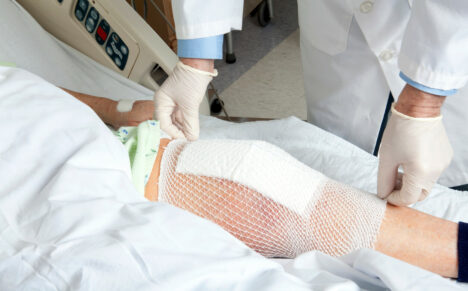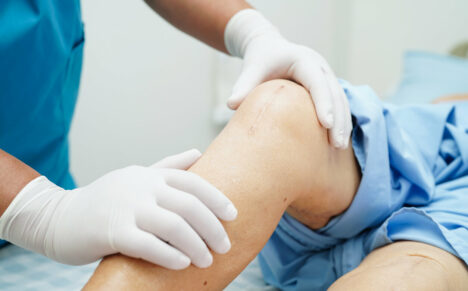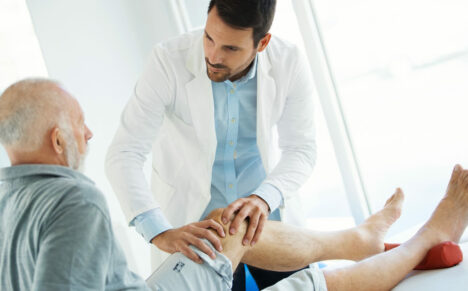Osteoarthritis is the most common form of arthritis in the world, and knee arthritis (osteoarthritis of the knee) is responsible for about 80% of cases of arthritic pain. As the condition progresses and no longer responds to simple remedies like medication and exercise, then joint replacement surgery may be your answer if you want to get moving freely again.
Knee replacement surgery is one of the most commonly performed and most successful orthopedic surgeries performed today. If your orthopedic surgeon has recommended knee replacement surgery, you will want to do everything you can to ensure you get the best results possible.
Your orthopedic surgeon knows how to give you a new joint that will last for years. Let’s talk about some of the things that you can do for yourself to get the most from your knee replacement surgery, and where you can go for a consultation and optimum treatment of your knee pain.
Preparing Your Body Before Knee Surgery
A good outcome largely depends on how well you prepared beforehand. Before the surgery, try to get yourself into the best physical shape possible. If you are overweight, try to lose some weight with a healthy diet of lean protein, fruits, and vegetables.
Try to incorporate exercise you enjoy into your lifestyle. Walk up and down the block every day at your favorite time of the day. Ask your surgeon about any specific exercises they may want you to do to strengthen the muscles around the knee joint and to improve flexibility.
If you smoke, use this opportunity as your motivation to quit. Smoking robs you of the oxygen your body needs for efficient healing, it unnecessarily prolongs your recovery time, and it could potentially set you up for infection.
Getting Your Home Ready for Post-Op Recovery
It is also important to prepare your home for your recovery period. Initially, you will probably use some type of assistive device to get around, and there will be some temporary limitations to what you can do. Your balance may be off. It is sometimes best to recover on one floor (and not have to go up or down the stairs), so arrange your living space accordingly. It is also a good idea to add safety equipment like grab bars, railings, raised toilet seats, and shower chairs in the bathroom.
Especially if you are having outpatient surgery, you will need to arrange for someone to stay with you after your operation. Because falls are particularly harmful after knee replacement surgery, be sure that your home has adequate lighting and is free from tripping hazards like electrical cords, bric-a-brac, throw rugs, and toys. You may also need to have a trusted friend take care of your pet while you become acclimated to your new knee.
Make sure that your orthopedic surgeon has an updated list of all of your medications and supplements, and fill any prescriptions given to you before your surgery so you have plenty.
Recovering After Surgery
It is important to follow all of your post-operative instructions carefully. They are given to you to help you have the best recovery possible.
You may be prescribed antibiotics to prevent infection; take them exactly as directed. You may also have blood thinners. This is because orthopedic surgery and the reduced activity immediately afterward can increase your risk of developing blood clots, so it is important to take them as prescribed.
The Importance of Rehabilitation
You now have a new healthy knee joint – but without proper rehab, you will not get the benefit you deserve from the surgery.
You will receive very specific instructions on what you can, cannot, and should do after the surgery. It is very important to follow your rehab plan and not miss any physical therapy sessions. Expect to be told to keep your leg straight while lying down – no pillows to support your knee to avoid stiffness.
While sitting, you’ll also keep your legs aligned, with knees and feet all pointing in the same direction. Stairs should be taken one at a time, and also be sure to sit down while getting dressed.
In addition, you will learn the exercises to do under the guidance of a physical therapist who will monitor your progress.
You will be shown exercises to do two to three times per day for 20 to 30 minutes, in addition to regular walking. The exercise is meant to strengthen and stabilize your knee while improving flexibility.
Living Your Best Life After Knee Surgery
Within a few months, you’ll be back to your regular routine – enjoying low-impact activities and an active lifestyle. You should ask your orthopedic surgeon about what activities are recommended and what is not advisable. Continue to eat that healthy diet, control your weight, and exercise to keep all of your joints strong.
Your orthopedic surgeon will recommend follow-up appointments to monitor your progress. They will be able to check the health of your knee and identify any problems that you may not have noticed.
Don’t overdo it, but stay active, stay positive, and enjoy your newfound mobility.
Orthopedic Knee Surgeon in Raleigh
A knee replacement may be key to eliminating pain and immobility from your life once and for all. If you’re looking for a good knee surgeon in the Triangle, Dr. Brett Gilbert is a board-certified orthopedic surgeon with years of success performing knee replacement surgery, giving his patients the opportunity to live fuller lives again.
If you have any questions regarding surgery, are considering knee replacement surgery, or are looking for advice on dealing with knee arthritis or knee pain, our friendly team is here to help. Contact us today by calling us at (919) 788-8797 or you can request an appointment with Dr. Gilbert using our appointment request form, or you can self-schedule your appointment here.




